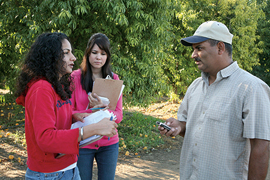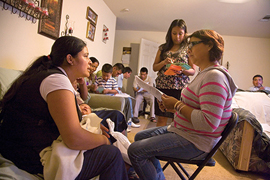CRLA stands at the forefront of a deep-rooted struggle between farmworkers, employers and the sun’s heat.
In the most recent instance, state officials are investigating whether a farmworker's death last Tuesday, July 2, 2013 in a watermelon field near Coalinga was related to extremely high temperatures in the Central Valley this summer.
While it is unclear whether this death is directly linked to heat-related illness, when the temperatures soar well past 100̊F, as it has in recent weeks, farmworkers’ lives are in danger if they fail to observe the proper precaution taught by our Heat Stress Training Initiative or HSTI.
|
MARYSVILLE, CA - In Marysville, in California’s eastern Sacramento River Valley, migrant Mexican workers and immigrants from the Punjab region of India and Pakistan work together in crews picking and sorting peaches. During a CRLA field inspection, Preet Kaur, an attorney, and Sonia Garibay, a CRLA community outreach worker, interview Majeed Khan, a labor contractor to ensure legal working conditions for farm workers. |
MADERA, CA - Norma Ventura and Irma Luna, community workers for the Fresno office of California Rural Legal Assistance, inform/educate/teach/train families of Indigenous Mixteco Mexican farmworkers about the dangers of heat stress in the fields. Pictured: Irma Luna and Norma Ventura help Maria Gonzalez. |
Under our HSTI (funded in part by a grant from the US Department of Labor, Susan Harwood Training Program), CRLA staff travel to fields, rural neighborhoods and farmworker communities to teach about the dangers of heat stress and support workers, who exercise their right to protection from the harmful effects of working outdoors in temperatures of up to 110 degrees.
Since October 2010, CRLA has provided heat illness prevention training to farmworkers and other outdoor, low-wage workers, their employers and supervisors. The HSTI has targeted three heavily impacted regions of the state – the San Joaquin Valley, Northern California and the Southern California Border region - with a campaign of strategic heat illness outreach coupled with “education for action” training sessions. To date, these outreach efforts have reached more than 3,000 workers and nearly 200 employers.
“Heat Stress trainings are vital to farmworker safety. CRLA’s work saves lives each year in rural California, and now the food we eat is grown in safer conditions.”
Norma Ventura, CRLA Community Worker, Fresno, CA
Why is Heat Stress Work Important?
Each year more and more farmworkers travel to CA to help with agricultural demands and increasing the already well-established farmworker population. More than 10,200,000 recent immigrants1 call CA home and every year the state absorbs more than 440,000 farmworkers2 to harvest and plant crops. Farmworkers perform repetitive and physically strenuous tasks while enduring excessive heat and sun exposure. The risks of a worker experiencing heat illness increase when doing strenuous physical activity without shade, proper rest periods and water. To prevent heat-related illness and other workplace injuries, CRLA conducts a combination of field monitoring and health and safety trainings as part of our HSTI.
Field Monitoring – Weekly, teams of CRLA staff visit work sites and farms looking for incidents where employers do not provide basic health and safety protections like water, shade, rest breaks and bathrooms with proper hand washing facilities. CRLA outreach workers go directly into the fields to ensure employers comply with health and safety regulations, especially the California Heat Illness Prevention Standard, which triggers specific shade requirements when temperatures reach just 85°F. During these visits, CRLA staff provide basic training to employers and identify violations on site, such as a lack of shade for workers, bathrooms, or hand washing facilities. They often find dirty drinking water and a lack of employer- provided training to farmworkers on heat illness prevention, which prompts CRLA to step in and conduct heat stress trainings.
Heat Stress Trainings – Farmworkers in CA have died in the fields from preventable heat-related illness. Though state and federal laws protect their health and safety, the heat-stress death toll remains a critical issue. CRLA believes that many farmworkers, most of whom speak Spanish or an Indigenous language, can help to change this by exercising their rights to heat protection in the fields and on the job. CRLA’s heat stress training helps workers learn to prevent heat illness, recognize the symptoms of heat stress and know what to do if they or a co-worker become ill. They learn that they have the right to drinking water, shade and rest breaks. Equally important, workers learn that they can report worksite health and safety violations.
CRLA conducts these interactive heat stress trainings in Spanish and Indigenous languages such as Mixteco and Triqui. A team of skilled CRLA Community Workers travel to local schools, migrant parent meetings, Mexican consulates, food pantries and labor camps to provide these trainings to workers. Workers have also reached out to their local CRLA office and have requested trainings for themselves and family members. Workers have offered their houses to receive these trainings because they rarely receive them at work.




